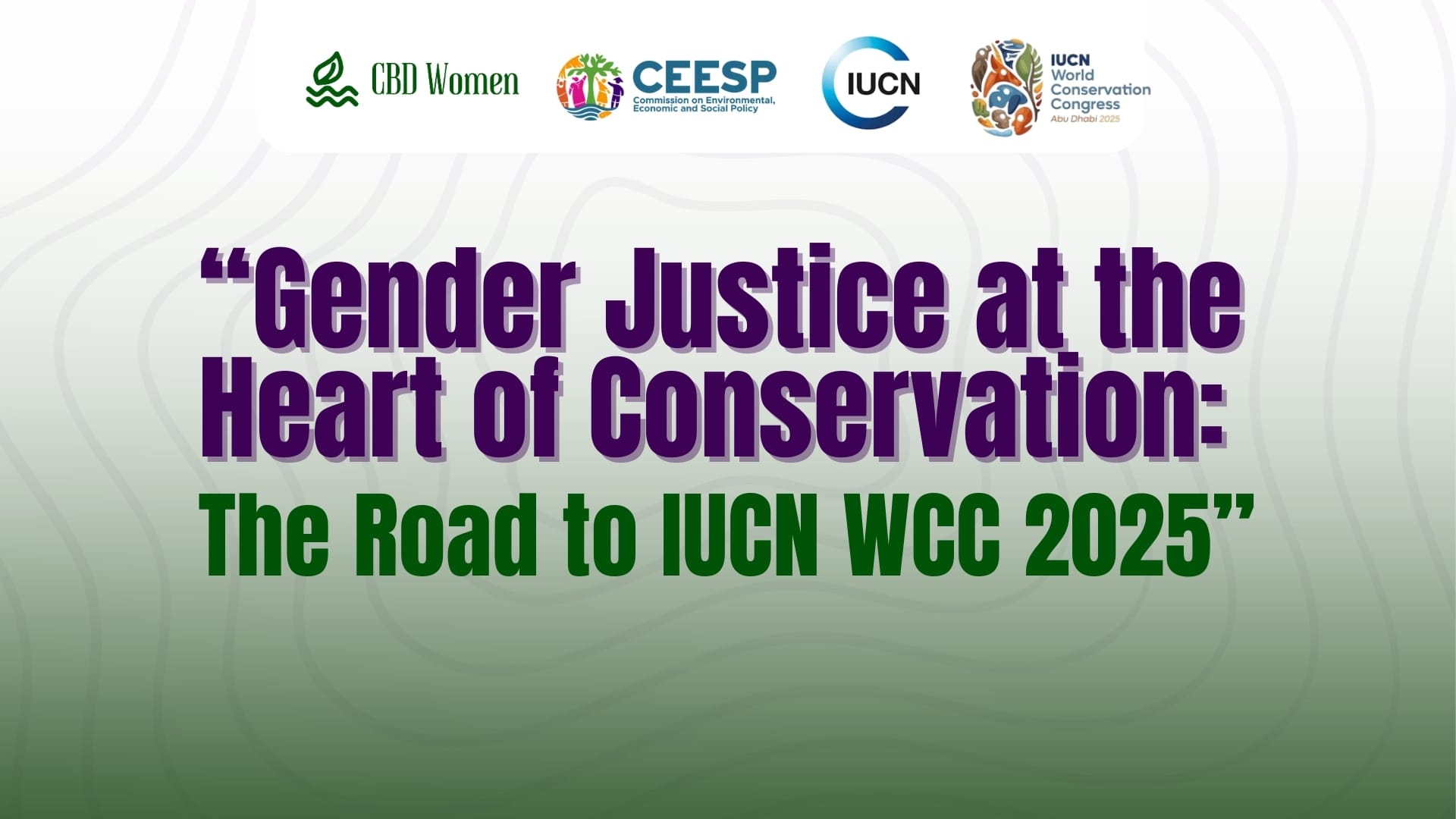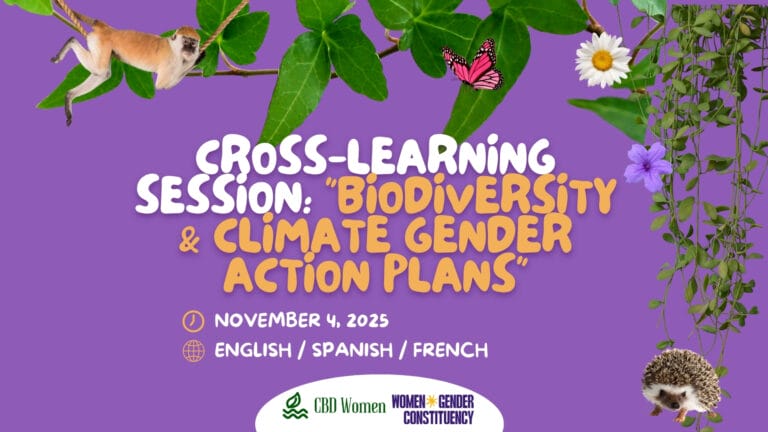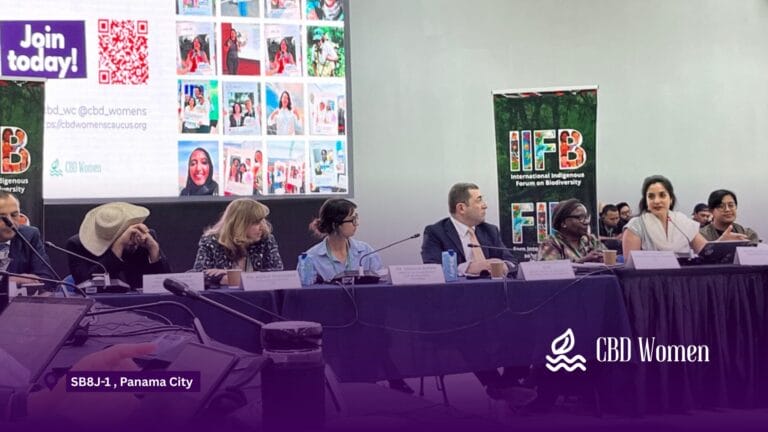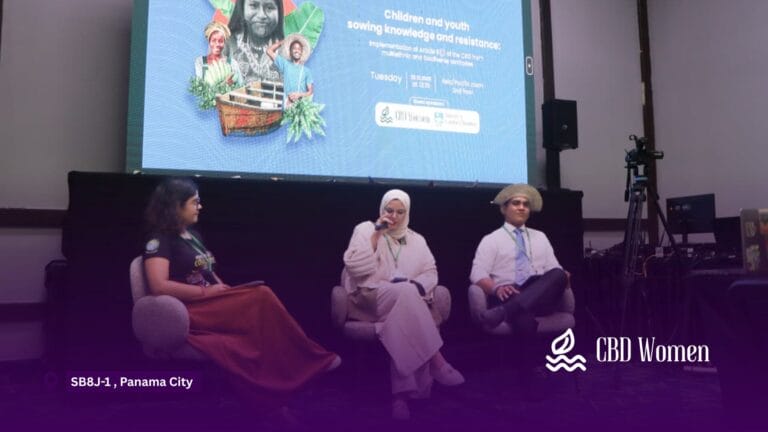By Ms. Fatima El-aaraby, CBD Women’s Caucus communication & outreach project officer
Disclaimer: The views expressed in this blog are those of the author and do not necessarily reflect the official position or opinions of the CBD Women’s Caucus
On September 17, 2025, the CBD Women’s Caucus, IUCN Human Rights and Conservation Team, and IUCN CEESP co-hosted the webinar “Gender Justice at the Heart of Conservation: The Road to IUCN WCC 2025.” The session brought together conservation professionals, women leaders, Indigenous organizations, and youth advocates to call for gender justice at the core of IUCN’s new Programme of Work (2026–2029), set for adoption at the upcoming World Conservation Congress—the world’s largest environmental decision-making forum.
Opening Reflections
The session began with Ms. Ana di Pangracio, IUCN Councillor and former member of the Board of Directors of the CBD Women’s caucus, strongly reminding us that conservation cannot succeed if gender justice remains an afterthought. She highlighted the leadership and knowledge of women and youth as indispensable to effective governance and conservation outcomes.
Following, Ms. Jackie Siles from the IUCN Human Rights and Conservation Team, outlined how the upcoming IUCN Work Programme will integrate gender commitments across its priorities. She emphasized the importance of moving beyond policy statements to measurable implementation and accountability.


Gender Justice in Action – Perspectives from Across the Union
The panel showcased diverse perspectives on advancing gender justice within conservation.
- Mr. Fred Loure, Program Manager at the Ujamaa Community Resource Team (UCRT) in Tanzania, shared the groundbreaking achievement of securing women’s leadership rights in the Maasai constitution. He stressed that gender justice is a long-term process requiring patience, awareness, and community-based tools.
- Ms. Amelia Arreguín, Vice-Chair of IUCN CEESP and Coordinator of the CBD Women’s Caucus, highlighted the vital role of IUCN Commissions in advancing gender justice. She stressed that all commissions must recognize and value women’s leadership and knowledge—both technical and traditional—while fostering spaces where young women are respected.
- Ms. Ola Dababneh, Gender Officer at the IUCN Regional Office for West Asia (ROWA), discussed regional approaches to gender mainstreaming. She highlighted lessons from West Asia on how offices and members can systematically integrate gender considerations across all projects, all the way since inception, funding and evaluation.
- Ms. Marleny Oliva, Coordinator of the Gender Equality, Multiculturalism, and Persons with Disabilities Unit at Guatemala’s Ministry of Environment and Natural Resources, shared government-led efforts to mainstream gender in national policies. She underlined the importance of sex-disaggregated data, gender action plans, and monitoring frameworks.
The dialogue illuminated both successes and challenges, from grassroots community achievements to institutional barriers that must be overcome.

Gender calendar at WCC 2025
We wrapped up by launching a collaborative Gender at WCC 2025 – Public Calendar —a one-stop space to find all gender-related events at the Congress. This ‘live’ calendar makes it easier for advocates and allies to connect and engage. If you’re organizing or speaking at a gender-focused event, send the details to [email protected] and we’ll add it in!
Looking ahead
Finally, Ms. Jackie Siles emphasized the urgency of collective action, highlighting that gender justice is central to conservation and must be embedded in every decision. As she noted, the road to WCC 2025 is a crucial opportunity for the Union to demonstrate that gender justice is not optional; it is essential for effective conservation outcomes.




